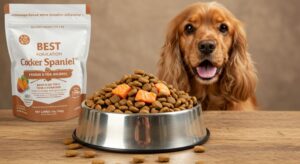Cocker Spaniels are one of the most adorable and affectionate dog breeds, but they’re also prone to allergies, especially food allergies. If your furry friend is constantly itching, has chronic ear infections, or suffers from digestive issues, it might be time to reevaluate their diet. In this guide, we’ll break down the best dog food for Cocker Spaniels with allergies, focusing on hypoallergenic ingredients, nutritional balance, and vet-recommended formulas.
Why Do Cocker Spaniels Get Food Allergies?

Cocker Spaniels, like many purebred dogs, can develop sensitivities to certain ingredients commonly found in commercial dog food. Common culprits include:
- Chicken
- Beef
- Dairy
- Corn
- Wheat
- Soy
These ingredients can trigger an immune response, causing symptoms like skin irritation, gastrointestinal distress, and chronic ear infections—a common issue in Cocker Spaniels due to their floppy ears.
Signs Your Cocker Spaniel Has a Food Allergy
Before switching your dog’s food, it’s important to confirm whether they actually have an allergy. Common signs of food allergies in Cocker Spaniels include:
- Itchy skin and excessive scratching
- Hot spots or red, inflamed areas
- Recurring ear infections
- Diarrhea or vomiting
- Excessive licking of paws
- Hair loss
If your dog shows any of these symptoms, consult your vet. They may recommend an elimination diet to identify the specific allergen.
What to Look for in Dog Food for Allergic Cocker Spaniels
When shopping for the best dog food for your Cocker Spaniel with allergies, consider the following:
- Limited Ingredient Diets (LID): These recipes use fewer ingredients to reduce the risk of allergic reactions.
- Novel Protein Sources: Proteins like duck, venison, or salmon that your dog hasn’t eaten before can help avoid allergic triggers.
- Grain-Free or Gluten-Free Options: While not all Cocker Spaniels are grain-sensitive, some benefit from a grain-free diet.
- Omega-3 Fatty Acids: These help reduce inflammation and improve skin and coat health.
- No Artificial Additives: Avoid preservatives, colors, and flavorings that can irritate your dog’s system.
Top 5 Best Dog Foods for Cocker Spaniels with Allergies
1. Hill’s Prescription Diet d/d Skin/Food Sensitivities
Key Features:
- Hydrolyzed protein to minimize allergic reactions
- Limited ingredients
- Veterinarian-recommended
Hill’s d/d formula is one of the most trusted options for dogs with serious food sensitivities. It’s designed to eliminate common allergens and support skin health.
2. Blue Buffalo Basics Limited Ingredient Grain-Free Turkey & Potato Recipe
Key Features:
- Real turkey as the first ingredient
- Grain-free and gluten-free
- No chicken, beef, dairy, or eggs
Blue Buffalo’s Basics line offers excellent allergy-friendly recipes. This turkey and potato formula is easy on your Cocker Spaniel’s digestive system and promotes a healthy skin and coat.
3. Natural Balance L.I.D. Sweet Potato & Fish Formula
Key Features:
- Limited ingredients
- Single protein source (fish)
- Rich in omega-3 fatty acids
Natural Balance is well-known for their L.I.D. (Limited Ingredient Diet) formulas. This one combines salmon with sweet potato, making it a great hypoallergenic option that supports skin and coat health.
4. Canidae PURE Limited Ingredient Salmon & Sweet Potato
Key Features:
- Only 8 key ingredients
- High in omega fatty acids
- Grain-free
Canidae PURE is perfect for sensitive dogs. With just a handful of wholesome ingredients, this recipe reduces the risk of allergic reactions while still offering complete nutrition.
5. Royal Canin Veterinary Diet Hydrolyzed Protein
Key Features:
- Hydrolyzed soy protein
- Ideal for food elimination trials
- Supports skin and digestive health
This vet-prescribed diet breaks down proteins to minimize the chance of an allergic reaction. It’s excellent for diagnosing and managing severe food allergies.
Homemade Dog Food: A Natural Option for Allergic Cocker Spaniels
Some dog parents choose to prepare homemade meals for their allergic dogs. This allows full control over the ingredients and helps isolate allergens. A basic hypoallergenic recipe might include:
- Cooked lean turkey or lamb
- Brown rice or quinoa
- Steamed carrots and green beans
- Fish oil or flaxseed oil for skin health
Always consult your vet or a canine nutritionist before switching to homemade food to ensure your dog gets all the necessary nutrients.
Transitioning to a New Diet: Do It Gradually
When switching your Cocker Spaniel to a new food, do it slowly over 7–10 days:
- Start with 25% new food mixed with 75% old food.
- Increase to 50/50 after a few days.
- Then 75% new, 25% old.
- Finally, transition to 100% new food.
This gradual approach helps avoid digestive upsets and allows your dog’s body to adjust.
Supplements That Help With Dog Allergies
Alongside switching to allergy-friendly dog food, some supplements can provide added relief:
- Fish Oil: Rich in omega-3s to reduce inflammation
- Probiotics: Support digestive health and boost the immune system
- Quercetin: A natural antihistamine found in some allergy support chews
Look for products specifically designed for dogs, and again, talk to your vet before adding new supplements.
Final Thoughts
Finding the best dog food for a Cocker Spaniel with allergies can make a huge difference in your pup’s quality of life. By identifying the right ingredients, avoiding common allergens, and possibly incorporating supplements, you’ll help your dog feel more comfortable, healthy, and happy.
Always consult your vet when making significant dietary changes, and monitor your dog closely as you transition to a new food.
FAQs About Allergies in Cocker Spaniels
Q: Can Cocker Spaniels be allergic to chicken?
Yes, chicken is a common allergen. Switching to novel proteins like salmon or duck may help.
Q: How long does it take to see improvement after changing food?
You may start seeing improvements within 2–4 weeks, but full results can take up to 12 weeks.
Q: Should I choose grain-free dog food for my Cocker Spaniel?
Not necessarily. Grain-free diets help some dogs, but the key is identifying specific allergens rather than eliminating grains across the board.